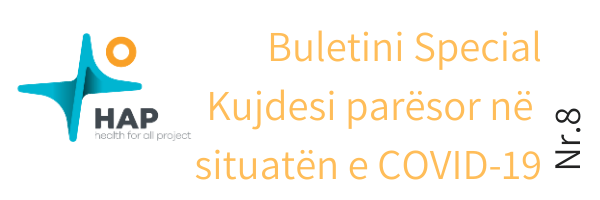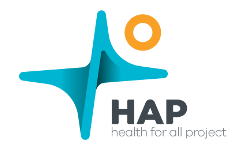
During this week there are 2 new cases of COVID-19 infection identified in the Fier region, whereas there are still no cases in the Dibra region. The service in the primary health care centers in both regions is gradually returning to normality, where there is an increase in the number of visits to health centers.
Starting May 18, 2020, the teaching in high schools shall be resumed only for high school graduates, observing the instructions of the health authorities. Based on this, health centers should take measures that a nurse be in the school premises to perform the temperature measurements for the students.
The Health for All project has continued to prepare and publish training materials for health professionals in response to most frequent asked questions about COVID-19. Currently, 4 materials related to the symptoms and spread of COVID-19 have been published at the official HAP website: self-isolation and self-quarantine, protection against infection for pregnant women and young mothers and the importance of physical activity during COVID-19. The materials may be downloaded HERE. (only in Albanian).
The same topics have been prepared for the general public and may be downloaded HERE.
The role of health post nurses in remote areas in coping with COVID-19 infection
Lejçan is a small village with only 270 inhabitants, about 1 hour and a half away from Bulqiza town. Despite the small number of residents and the distance from urban centers, the risk of COVID-19 infection is just as real as in any other corners of the country, due also to immigrants, some of whom have been repatriated recently. For this reason, health post nurses in such areas are also engaged in tracking cases with COVID-19 infection, following up the health status of the persons returning to Albania after visiting/living in one of the neighboring countries.
Marius Cani, is the nurse of the Lejçan health post (Ostren HC) and tells us how he monitors the health condition of a person who is self-quarantined after returning to Albania. “I had the case of a repatriated person from Greece who was quarantined for 14 days in a hotel in Permet town”, Marius tells. “After the 14-day quarantine at the hotel, he had to stay another 2 weeks self-quarantined at home, and during this time, I visited him once a day at home, respecting the distance and other protective measures and I called him every 6 hours to ask about any possible temperature and symptoms of COVID-19 infection such as cough or difficulty breathing”.
Vjollca, a nurse at Rabdisht health post (Melan HC) tracks also cases in her village based on data she receives from the family doctor and the village alderman. She points out that although she knows well all the inhabitants, people do not always respond well to her routine phone calls to monitor the health of the contacts: “There are cases”-she tells us-“when people show that they are displeased for the fact that they are already informed regarding COVID-19 infection and feel somewhat prejudiced”. Despite this, Vjollca is determined to do her best to ensure that COVID-19 does not spread in her village of 350 inhabitants and emphasizes that “Our role is also to face and overcome prejudices”.
Like Marius and Vjollca, there are many nurses working in remote areas, where it is impossible the presence of a family physician at any time. They are the remote eye, ear and hand of the doctor. A very big thanks goes to these nurses who work in very difficult conditions, with sacrifices, but with a lot of will and humanism.

